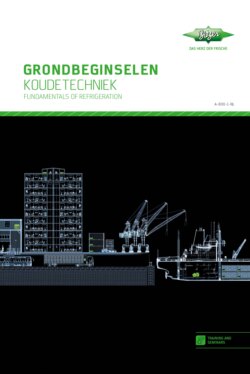Читать книгу GRONDBEGINSELEN KOUDETECHNIEK / In twee talen Nederlands/Engels - Volker Stamer - Страница 21
На сайте Литреса книга снята с продажи.
ОглавлениеOnder het
kookpunt
Below
boiling point
t < 100°C
Kooktoestand
(kookpunt)
Boiling state
(boiling point)
t = 100°C
Natte damp
Wet vapour
t = 100°C
Verzadigde damp
(dauwpunt)
Saturated vapour
(dew point)
t = 100°C
Boven het kookpunt
Kooktemperatuur
Above
boiling point
t > 100°C
Onderkoelde vloeistof
Subcooled liquid
Kokende vloeistof
Boiling liquid
Verzadigde damp
Saturated vapour
Oververhitte damp
Superheated vapour
Fig. 12 Verdamping bij constante druk (p = 1,013 bar) met water als voorbeeld
Evaporation at constant pressure (p = 1.013 bar) using water as an example [TWK]
1 Onder het kookpunt → t < 100 °C
Het kookpunt van water bij een omgevingsdruk van
1,013 bar is 100 °C. Als het water een temperatuur
heeft onder het kookpunt, spreken we van „onderkoeld“
water (algemeen: „onderkoelde vloeistof“). Water met
een temperatuur van 20 °C heeft dus een onderkoeling
van 100 °C - 20 °C = 80 K.
2 Kooktoestand (kookpunt) → t = 100 °C
Als het water wordt verwarmd tot 100 °C, dan blijft de
temperatuur aanvankelijk constant. Het kookpunt is
bereikt. Het water is (nog) in vloeibare toestand.
3 Natte damp → t = 100 °C
Wanneer de warmtetoevoer wordt verhoogd, vormen
er zich de eerste dampbellen. Het aandeel waterdamp
neemt toe, terwijl het aandeel vloeibaar water met
dezelfde hoeveelheid afneemt. Is er sprake van zowel
een vloeibare als een gasvormige fase, dan spreken
we van natte damp. De temperatuur van het „mengsel“
is nog steeds 100 °C.
4 Verzadigde damp (dauwpunt) → t = 100 °C
Als het aandeel damp 100% is (dus geen vloeistof), is
het dauwpunt bereikt. Hier spreken we ook wel van ver-
zadigde damp. De damptemperatuur is (nog) 100 °C.
1 Below boiling point → t < 100°C
The boiling point of water at an ambient pressure of
1.013 bar is 100°C. If the water has a temperature
below boiling point, it is referred to as ‘subcooled’ water
(more generally: ‘subcooled liquid’). Water at 20°C
therefore has a subcooling of 100°C minus 20°C
= 80 K.
2 Boiling state (boiling point) → t = 100°C
If the water is now heated and reaches a temperature
of 100°C, the temperature initially does not increase
further. The boiling point is reached, the water is (still)
in liquid state.
3 Wet vapour → t = 100°C
If more heat is added, the first vapour bubbles occur.
The proportion of vapour increases, while the propor-
tion of water decreases by the same amount. If the
liquid and the gaseous phase occur simultaneously,
we refer to wet vapour. The temperature of the ‘mixture’
remains at 100°C.
4 Saturated vapour (dew point) → t = 100°C
If the vapour fraction reaches 100% (no liquid remain-
ing), the dew point is reached. We also refer to this as
saturated vapour. The temperature of the vapour is
(still) 100°C.
Grondbeginselen thermodynamica // Fundamentals of thermodynamics
23
